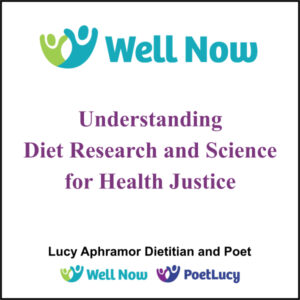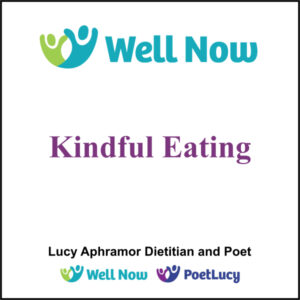Description
Date: Friday 30th January 2026
Time: 9.30am–4:00pm
Venue: The Gateway Centre, Chester St, Shrewsbury SY1 1NB
Close to Shrewsbury station
Cost: £190 (until Dec 29th) then £220. Lunch included.
The term health-gain was coined by the facilitator, dietitian Lucy Aphramor, to describe their approach, Well Now, and to differentiate the Well Now paradigm from both a weight-centric (dieting) and a non-diet approach and align Well Now with the broader health justice agenda.
‘Health-gain’ is now popularly used to describe an approach to dietary counselling that focuses on improving overall wellbeing and that is seen as an alternative to a standard, weight-centric, approach.
This training introduces the theoretical basis of the health-gain approach Well Now and gives you the skills to start to implement it immediately. The focus is on making sense of underlying theory and translating this into hands-on practice.
The training is designed to enable health, counselling, and fitness professionals to get started with health-gain practice. Food justice workers, community nutrition educators, academics, trade unionists, and policy makers will also find it relevant and are welcomed.
Using a biomedical ethical framework, and referring to the framework of evidence-based practice, and requirements to deliver against an equity, diversity and inclusion agenda, we will consider and critique underpinning data and associated claims of health-gain and a weight-centric approach. A key point is that anyone recommending dieting must have knowledge of any alternatives, such as a health-gain approach, to be competent to take informed consent. This section is designed to help learners assess the relative merits that different approaches to dietary counselling have for client wellbeing and social justice and what this means for their practice and role.
We will then draw on this critical thinking by translating it into practice. Specifically, we will consider how to introduce a health-gain approach to a client who has been told they need to lose weight because of a condition such as heart disease or diabetes.
The aim is that learners leave feeling confident they can get started with a health-gain approach and also that they feel equipped to foster generative conversations with curious andor sceptical colleagues.
By the end of the training learners will likely have/be able to
• Have improved critical thinking skills at the nexus of weight/health/social justice
• Know how to translate the theory of compassion into practice around eating
• Understand how social factors are relevant to diet-related diseases and what this means in practice
• Bring a critical understanding to concepts including fat stigma, body image, thin privilege
• Initiate discussion of a health-gain approach with a client expecting a weight-centric approach
• Help people make sense of how diet, BMI, social factors, and behaviours interact to impact overall health
• Engage in conversation on body size/fatness using respectful language informed by activist perspectives
• Reflect on the relevance of the un/learning personally and professionally






